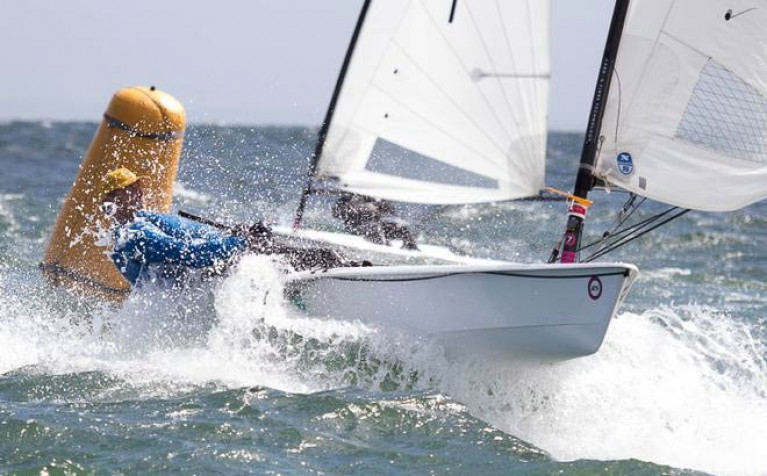You would expect the sailing community to be more understanding than most others of the difficulties inherent in setting out any sort of comprehensible and feasible plan for the resumption of life in all its forms as the Covid-19 pandemic recedes, for our sport is an activity of many unpredictables. There may have been large pandemics before. But they didn’t occur in a significant form in such a complex and acceleratingly busy a world as we’ve been living in since the turn of the century.
Thus you can certainly make plans and keep making plans, but it would be foolish to expect anything resembling a Fixed Plan, all-encompassing and set in stone.
In sailing a race, for instance, the variables of wind strength and direction, sea state, tidal conditions, and configuration of the fleet are changing in an infinite and endless continuum. Rigid plans are a delusion. We may not all be like ace helm Gordon Maguire, who is so aware of the relative wind changes that he can anticipate them in advance by some time, and sense them in real terms something like a fifth of a second ahead of getting the information from the electronics, all of which can add up to quite an advantage in a complex race. But even the most basic sailor knows that everything turns out at least slightly different from expectation, and we go forth in the fond belief that it might even be better than hoped.
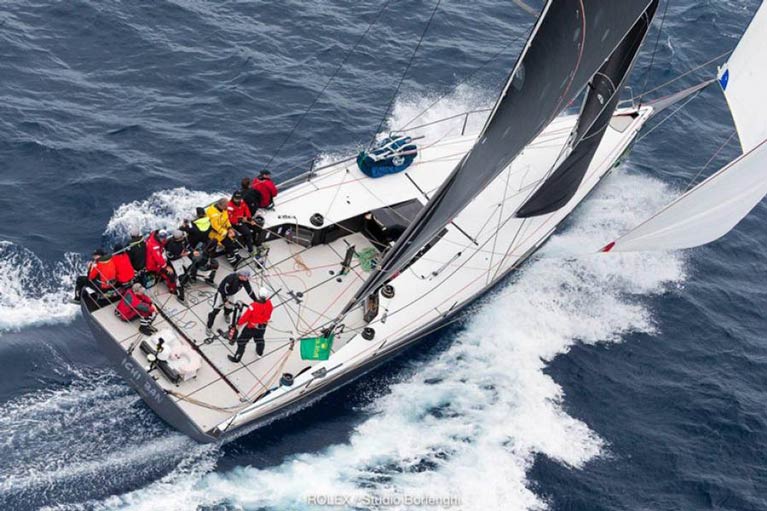 Gordon Maguire (yellow jacket) helming Ichi Ban to Rolex Sydney-Hobart Race victory. It is his enhanced ability to anticipate and utilise the continuous change in the sailing environment which has made him Australia’s most successful offshore racing skipper
Gordon Maguire (yellow jacket) helming Ichi Ban to Rolex Sydney-Hobart Race victory. It is his enhanced ability to anticipate and utilise the continuous change in the sailing environment which has made him Australia’s most successful offshore racing skipper
Equally, in cruising, the overall Cruise Plan can be a burden which is sometimes best abandoned - or at least put into storage - at an early stage. But with a flexibility of approach, your may eventually find alternative and more enjoyable ways of getting to your original cruise objective, and there are few summers with weather so bad that even the most adroit cruise management cannot provide something satisfactory to reflect on at season’s end.
So in contemplating the “return to normality” plans being put forth by the five different governmental administrations in what the late Gerald FitzGibbon (Eternal Honorary Secretary of the Howth 17 Class) used to describe as the Anglo-Celtic Archipelago, we see differences in approach sometimes so marked that we can only wonder if they are all dealing with the same basic problem.
The Government in London may set out a general plan for England, but it is immediately sniped at for its absence of savvy about how the average household functions, with the point being made that their current Cabinet includes exceptionally few women, even though Margaret Thatcher as Prime Minister once said that any woman who could competently run a household can make a fair fist of running a country.
 British Prime Minister Margaret Thatcher – she reckoned that the competent running of a household was excellent training for running a country.
British Prime Minister Margaret Thatcher – she reckoned that the competent running of a household was excellent training for running a country.
With this broad plan complete with too many specifics and hints at actual dates being run out and then changed next day, the various sailing and boating bodies have been making the best of it for their own areas of interest. Thus we find intriguing snippets such as the fact that family groups may do a spot of boating on their local waterways and canals provided they avoid using locks, where safe social distancing would be very difficult. But you wouldn’t get very far on most English canals without transiting a lock. In crowded England, these are highly sociable places, where the habit of lounging ashore and interacting with the boat crews going through is so prevalent that those who do it regularly are known among the boat people as “gangoozlers”. They’re a species unknown along the Shannon, our mighty waterway which is mercifully restricted to just seven locks, and has thousands of acres of clear uncrowded water.
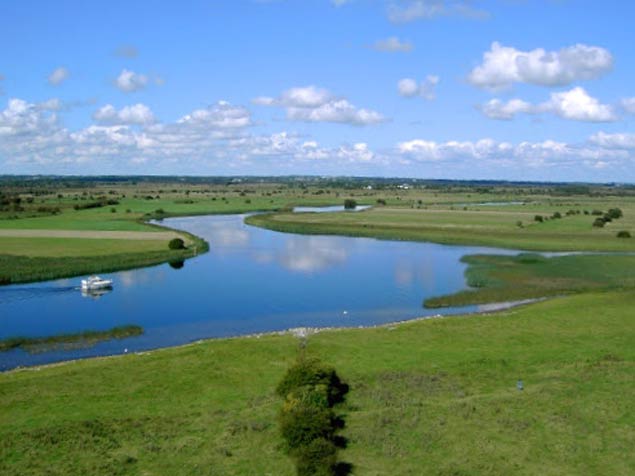 The lordly River Shannon provides much better opportunities for social distancing than the typical English canal.
The lordly River Shannon provides much better opportunities for social distancing than the typical English canal.
For the unfortunate Welsh with their long border with England, yet with a higher proportion of at-risk people in their population, the extension of the Lockdown is insisted. But whether the Welsh can stop the English pouring over the border this weekend is a moot point. Even at the height of the Lockdown, a policeman in Llandudno in North Wales flagged down a be-leathered man on a large shiny motorbike, to be told that he was just out running an urgent errand. The errand was apparently to buy sausages. His point of departure? Nottingham.
 In the Lockdown period in England, this has proved to be the ideal machine for nipping down to the shops for a packet of sausages
In the Lockdown period in England, this has proved to be the ideal machine for nipping down to the shops for a packet of sausages
Inevitably, away to the north, the instinctive hostility between the English and the Scots has been regularly re-surfacing. It’s only a matter of time – if it hasn’t been done already - before someone quotes the quintessential English writer PG Wodehouse’s comment: “It is never difficult to distinguish between a Scotsman with a grievance and a ray of sunshine”.
Meanwhile the rather wishy-washy slogan “Stay Alert” has become national policy. At least they’d the sense to use this version. There are those among us who can remember some other crisis when the official exhortation was “Be Alert”. This didn’t last long, as the local Voluntary Thought Police were soon adding “The World Needs More Lerts” underneath.
Whatever, already we are in the blame game, and on that count, we should remember the wickedly effective re-working of the pious thoughts of the famous American sports-writer Grantland Rice (1880-1954):
“And when the One Great Scorer comes,
To write against your name,
He marks not that you won or lost,
But how you spread the blame”
That will be the theme in London and elsewhere for quite some time, and in contemplating the happenings on that larger island next door, some of us might incline to the scary thought that we are seeing the Romans becoming Italians, with the Dark Ages imminent, and with the occasional complete pessimist perhaps even wishing that St George’s Channel were at least twice as wide.
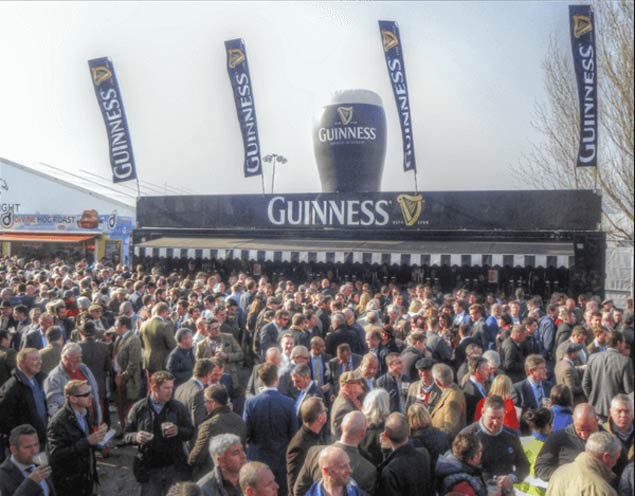 Social distancing, Cheltenham style. Even in imminent pandemic times, no patriotic Irish race enthusiast could be anywhere else.
Social distancing, Cheltenham style. Even in imminent pandemic times, no patriotic Irish race enthusiast could be anywhere else.
As it is, in retrospect there are two people across the water that we can blame for some of the Covid-19 in Ireland. One is whoever decided that the Cheltenham National Hunt Festival should go ahead, where the hazards were immediately obvious once it was under way. And the other is Jurgen Klopp. For had not Herr Klopp brought Liverpool Football Club to such a peak of excellence, their many Irish supporters would not have been obliged to mix at a crucial time in pandemic development with vast numbers of infective Spanish and Italian fans at the international championship fixtures that his inspired team management had made possible.
 Jurgen Klopp’s huge success in managing Liverpool FC may have contributed to Ireland’s experience of Covid-19
Jurgen Klopp’s huge success in managing Liverpool FC may have contributed to Ireland’s experience of Covid-19
Even with St George’s Channel at only fifty nautical miles wide, and the North Channel even narrower, there still seems to be a really useful saltwater cordon sanitaire between Ireland and chaos, and while there has been the occasional squabble, the level of social cohesion and adherence to the rules of Lockdown in Ireland have been encouragingly high. But such a balancing act can be maintained for only so long, and people are climbing the walls in their hopes of getting back to some form of sailing, or afloat in some way.
Thus this week here in Howth we’d a keen sea angler who thought he might get away with a couple of hours of his beloved sport if he launched his little outboard boat from an almost-forgotten ramp hidden away outside the back of the harbour. For although sailing is a complete no-no under total lockdown, as even the smallest sailing boat sticks out like a sore thumb, any little powered boat suddenly appearing past the harbour mouth is assumed by casual observers to be a local lobsterman going legitimately about his business, the launching and so forth having been well hidden from the real lobstersmen within the harbour.
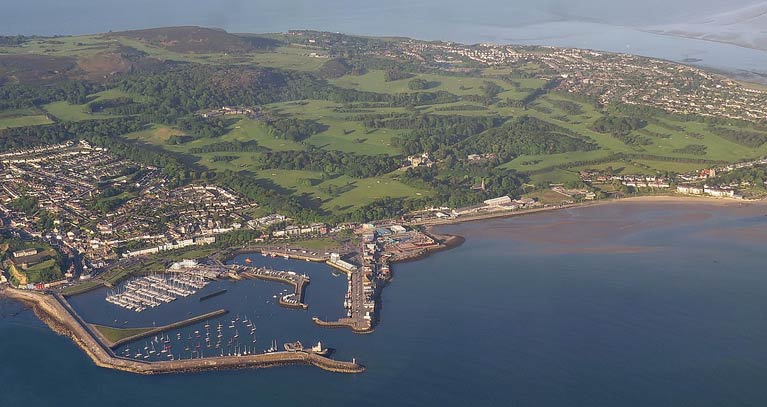 Howth Harbour from the north. A little-known launching ramp to the west of the harbour was utilized by a desperate sea angler to launch his boat in secret, but an engine break-down blew his cover.
Howth Harbour from the north. A little-known launching ramp to the west of the harbour was utilized by a desperate sea angler to launch his boat in secret, but an engine break-down blew his cover.
But God is not mocked, as our Cunning Cod Catcher discovered. His engine wouldn’t re-start when his fun was finished. So the Howth Inshore Lifeboat had to bring him in. But as there are so few clearly established laws and rules about how to act in this current exceptional situation, with no statutory body with any muscle to take responsibility and prosecute in some way, the Flexible Fisherman simply stayed absolutely schtum, didn’t say a single word to anyone, and it all just petered out when everyone had to go home for their tea.
But after Monday (May 18th) we’re told that easing is going to begin, and soon those golfers who have been managing to slip under the radar (for we’ve ten golf courses more or less within five kilometres of here) will now be legitimate provided they’re maintaining Social Distance.
That noted mover and shaker in sailing progress, Peter Ryan the Chairman of the Irish Sea Offshore Racing Association, reckons the Social Distance two metre requirement is the stumbling block, and while Mark Mansfield of Cork has been thinking long and seriously about how to resume keelboat racing while complying with pillars of the current policy, Peter Ryan reckons the authorities are going to have to re-think on this one, particularly if valid testing methods can be securely in place.
 Sociable times. Peter Ryan of ISORA (right) at the launching of a Race Sponsorship with John Rutter and Michael Martyn of Kona. But in the current difficult times, Ryan is looking at ways in which such socialising can be minimized in order to allow offshore racing to take place.
Sociable times. Peter Ryan of ISORA (right) at the launching of a Race Sponsorship with John Rutter and Michael Martyn of Kona. But in the current difficult times, Ryan is looking at ways in which such socialising can be minimized in order to allow offshore racing to take place.
Then too, we can expect mask-wearing to be mandatory. This is a pain for those of us who wear spectacles, as many mask designs cause our glasses to mist up, such that while we may be models of infection protection as we move about the place, it’s not a good look if you’re trying to ride a bike, drive a car or simply walk on a pavement in keeping with current social distance requirements, as you’ll be more concerned with not walking misty-eyed into barely-seen other people or trees or lamp-posts or buses.
So where is our much-vaunted “Sense of Freedom in Sailing” in all this? Well, it’s still there when sailing is in its purest minimalist form, which has to be kite-surfing or windsurfing. This is pop-up sailing, requiring virtually no shoreside infrastructure, and you don’t need a car, let alone a car and trailer, to get your “vehicle” into action. It’s absolutely fine and about as socially-distanced as you can get provided you remain in control of the situation. But if you get into difficulties and require rescuing, you’re immediately into a situation of intimate potential infection, and spoiling the sport for everyone else.
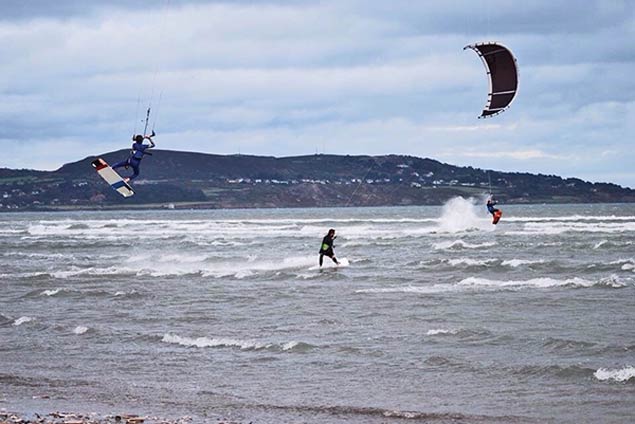 Kitesurfing in Dublin Bay. It may not be sailing as most of us know or expect it, but it’s the form of sailing which is most compliant with Social Distancing and other Covid19 requirements
Kitesurfing in Dublin Bay. It may not be sailing as most of us know or expect it, but it’s the form of sailing which is most compliant with Social Distancing and other Covid19 requirements
Moving on up the size scale, the next least infective sailing sport is surely for someone who has his or her own driving licence and a tow vehicle and a versatile trailer for something solo-sailed like a Laser or the significantly lighter RS Aero, ideally with a beach to launch from, for at all times it’s the avoidance of sociability-encouraging shoreside infrastructure which is the key.
But if we move into any boat size above that, the anti-infection problems rise exponentially, and we’re very quickly into areas where intense shoreside socializing is an integral part of the complete sailing/regatta experience. Yet although the cancellation of the Glandore Classics in mid-July was something we could take in our stride, as it was in a sense linked to the already-cancelled RCYC Tricentenary Cork Week, the cancellation of Cruinniu na mBad in Kinvara, scheduled for the 14th to 16th August, was something of a wake-up call (and a shock) when it came at precisely 11.19 on Wednesday morning.
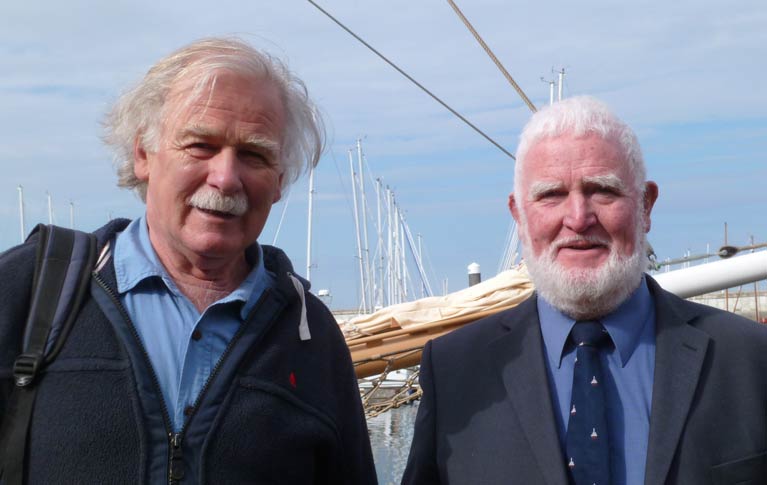 Dr Mick Brogan (left) with his Arctic voyaging shipmate Jarlath Cunnane at the Ilen Reception at the Royal Irish YC a year ago. It was with heavy hearts that Dr Brogan and his Committee decided this week that Cruinniu na mBad 2020 in Kinvara in August had to be cancelled. Photo: W M Nixon
Dr Mick Brogan (left) with his Arctic voyaging shipmate Jarlath Cunnane at the Ilen Reception at the Royal Irish YC a year ago. It was with heavy hearts that Dr Brogan and his Committee decided this week that Cruinniu na mBad 2020 in Kinvara in August had to be cancelled. Photo: W M Nixon
For mid-August is all of three months away, and with the current hopeful progress in handling the pandemic, we couldn’t help but hope that Kinvara might be a real possibility. But the Kinvara chairman Dr Mick Brogan is a Connacht GP in addition to his many traditional boat regatta and voyaging credentials, he brought his medical knowledge to his Committee’s acute awareness of just how un-self-consciously and totally sociable the Kinvara gathering is, and they regretfully but decisively pulled down the shutters.
In fact, Kinvara during Crunnui na mBad is sociability on a scale which well matches the apres-ski scene in the Alpine village of Ischgi in the Austrian Tyrol, which was notoriously one of the earliest hotbeds of Covid-19 infection in Europe, and it would be tempting fate and rejecting the science to think that even three months hence, Cruinnui na mBad could safely be staged.
 Hotbed of infection – the après ski scene at Ischgi in Austria
Hotbed of infection – the après ski scene at Ischgi in Austria
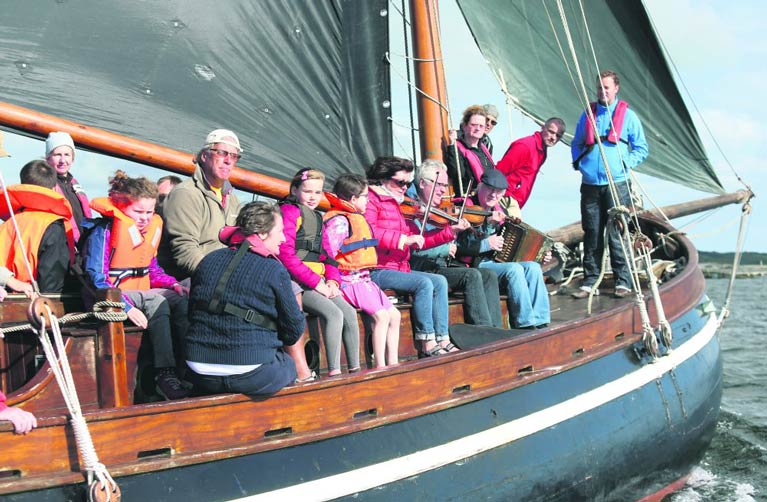 Where social distancing is impossible – aboard Mick Brogan’s traditional ketch Mac Duach at Cruinniu na mBad at Kinvara
Where social distancing is impossible – aboard Mick Brogan’s traditional ketch Mac Duach at Cruinniu na mBad at Kinvara
But not all sailing events are so closely inter-woven with a massive social gathering ashore, and while it’s a bit rough on established yacht club hospitality facilities to suggest such a thing, in the extremity of our current situation, with enthusiastic sailors mad keen to get afloat, it should be possible to devise sailing events involving little or no shoreside infrastructure at all.
We discussed some aspects of this four weeks ago in outlining Peter Ryan of ISORA’s thinking about the possible staging of the Dublin Bay to Cork Harbour Race as early as 31st July, and it’s a theme which can usefully be developed if the authorities don’t completely put the kibosh on such ideas.
For the heart of it all is ISORA’s offshore nature. It could be argued that its HQ is a waypoint midway between Dublin Bay and Anglesey. Thus all its activities can be totally offshored and certified disease-free. Its members’ boats would only be eligible to race if they can produce an electronically-verified medical certificate showing that all their crews are virus-free as they assemble aboard to race. Thus they will in effect become a healthy family bubble going sailing.
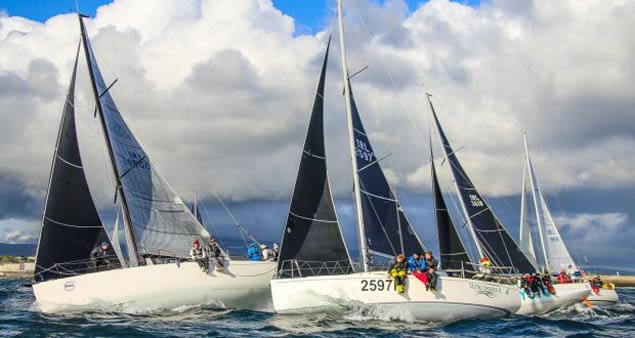 The ISORA fleet getting away for an offshore race which started outside Dun Laoghaire Harbour. Provided each crewmember is certified free of Covid-19, ISORA could provide racing without any direct reliance on shoreside infrastructure or facilities. Photo Afloat.ie/David O’Brien
The ISORA fleet getting away for an offshore race which started outside Dun Laoghaire Harbour. Provided each crewmember is certified free of Covid-19, ISORA could provide racing without any direct reliance on shoreside infrastructure or facilities. Photo Afloat.ie/David O’Brien
As for all the administration of the racing, it can be done with a fast and seaworthy committee boat (something like John Brennan’s new Redbay Stormforce 1650 as recently revealed on Afloat.ie would be ideal) complete with virus-free crew. The speed and seaworthiness are important as both the start point and the finish as monitored by this one boat have to be kept as flexible concepts, and while the use of a shore point for the other end of the start and finish lines is preferable to give the people on land some sense of identifying with the race, it’s not essential, and the South Burford Buoy in Dublin Bay and the Daunt Buoy off Cork Harbour could serve equally well.
It’s appreciated that with such a setup, the temptation to simply keep the fleet in the Irish Sea and make up the miles with a course taking in the Isle of Man or other in-place fixed marks would be considerable. But we have to remember we’re talking 24-carat gold sailing history here with the 160th anniversary commemoration of the totally-pioneering Dublin Bay to Cork Harbour Race of 1860, so a bit of respect for some tradition is very much in order.
Meanwhile, there’s nothing more exasperating than people insisting that they have to have a clearcut and transparent plan with definite figures and real dates so that they can “confirm the arrangements of their own personal programme”.
You would think that we’re facing into a busy summer with a hectic choice of May Balls, June Regattas, and July Gala Events. But the fact is, folks, we’re facing into a desert. Thus ingenious sailing ways of getting around this are now top of the agenda, but they’re not going to happen any time soon. And with scant rainfall since February, it may become a desert in more ways then we’d like.
 With some really imaginative thinking and compliance with restrictions, we may be able to ensure that this is not the memory we carry forward from the Irish sailing season of 2020.
With some really imaginative thinking and compliance with restrictions, we may be able to ensure that this is not the memory we carry forward from the Irish sailing season of 2020.
While many glassfibre boats may have been kept happily afloat through the winter in their marina berths, most wooden traditional and classic craft have been lifted ashore. Even where they are stored under good covers, the recent prolonged periods of bright sunlight, extreme afternoon heat, and exceptional night-time cold have been very bad indeed for their old timbers. Ideally, they should be afloat as soon as possible. But if that isn’t permitted until some time in June, then relief can be provided with regular gentle hosing.
Yet already we’re being warned of imminent water shortages, and it’s only mid-May. The use of hosepipes might soon be severely curtailed. Could it be that - to add to all our woes - we’re going to finally have to accept that, for many years, we have been managing our island’s unrivalled availability of perfect freshwater with the same expertise that the Venezuelans have been showing in the handling of their abundant oil reserves?
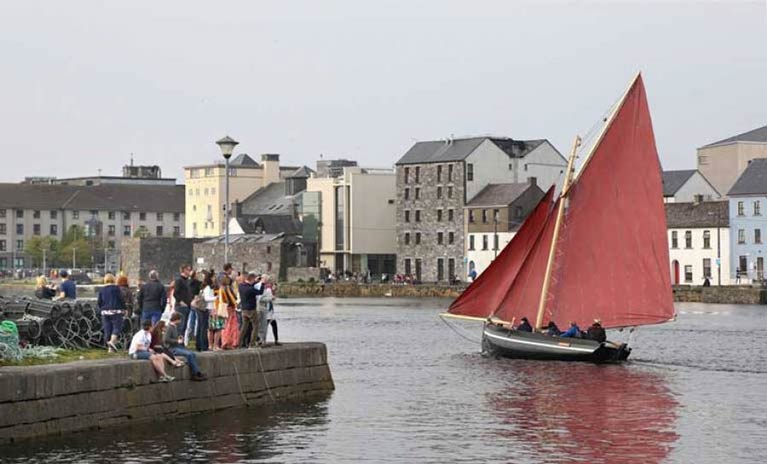 The restored Gleoiteog type Galway Hooker Lovely Anne sailing into the River Corrib off The Claddagh in Galway. The timbers of traditionally-built wooden boats like this are particularly prone to deterioration when ashore in hot weather and intense sunshine. They need to be regularly dampened at the very least, and ideally, they should be afloat
The restored Gleoiteog type Galway Hooker Lovely Anne sailing into the River Corrib off The Claddagh in Galway. The timbers of traditionally-built wooden boats like this are particularly prone to deterioration when ashore in hot weather and intense sunshine. They need to be regularly dampened at the very least, and ideally, they should be afloat




























